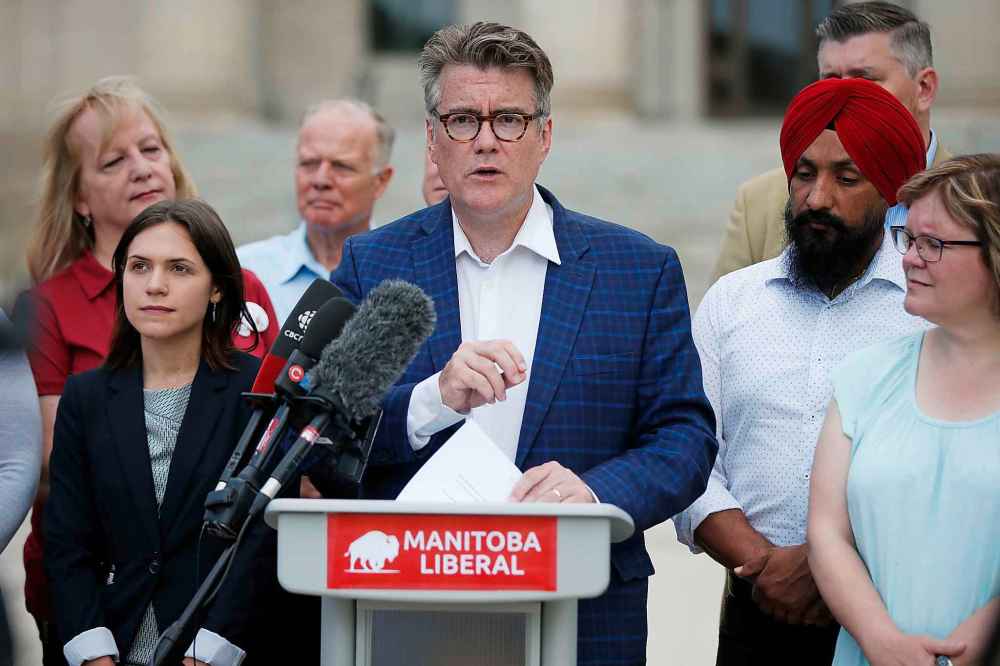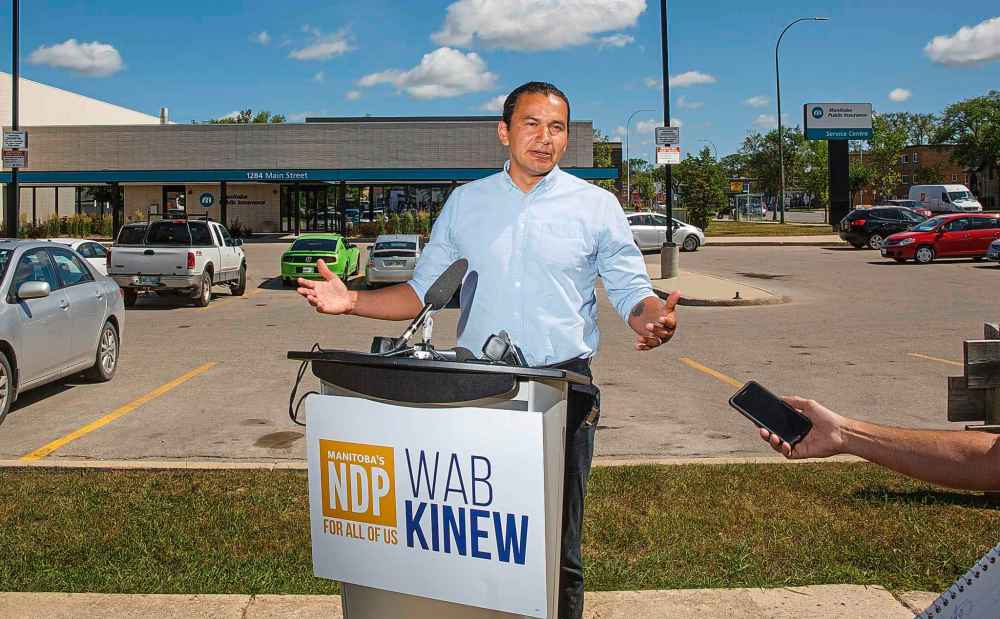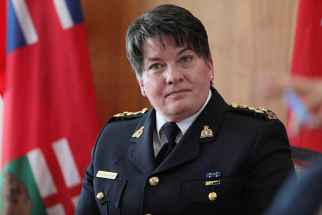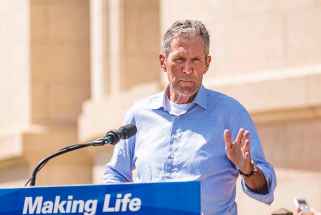Never-ending election campaign has yet to begin
Read this article for free:
or
Already have an account? Log in here »
To continue reading, please subscribe:
Monthly Digital Subscription
$0 for the first 4 weeks*
- Enjoy unlimited reading on winnipegfreepress.com
- Read the E-Edition, our digital replica newspaper
- Access News Break, our award-winning app
- Play interactive puzzles
*No charge for 4 weeks then price increases to the regular rate of $19.00 plus GST every four weeks. Offer available to new and qualified returning subscribers only. Cancel any time.
Monthly Digital Subscription
$4.75/week*
- Enjoy unlimited reading on winnipegfreepress.com
- Read the E-Edition, our digital replica newspaper
- Access News Break, our award-winning app
- Play interactive puzzles
*Billed as $19 plus GST every four weeks. Cancel any time.
To continue reading, please subscribe:
Add Free Press access to your Brandon Sun subscription for only an additional
$1 for the first 4 weeks*
*Your next subscription payment will increase by $1.00 and you will be charged $16.99 plus GST for four weeks. After four weeks, your payment will increase to $23.99 plus GST every four weeks.
Read unlimited articles for free today:
or
Already have an account? Log in here »
Hey there, time traveller!
This article was published 31/07/2019 (2324 days ago), so information in it may no longer be current.
It may go down as the longest unofficial election campaign in Manitoba history.
Even those who have checked out of work and into their cottage finery must be aware the 2019 provincial push has started in earnest. Candidates are knocking on doors, pamphlets are being distributed, and party leaders are making promises.
There’s only one small problem: the election has not officially begun.

When Premier Brian Pallister held a news conference on the sun-drenched southern lawns of the Manitoba legislature in June to confirm a general election would be held Sept. 10 — a full 13 months before he was required to do so by law — he inadvertently kicked off what is fast becoming a never-ending campaign.
Exactly when the official contest will begin remains a bit of a mystery. By law, Manitoba campaigns can last between four and five weeks. If Pallister were to opt for a 34-day option, he would have to drop the writ of election sometime around Aug. 7; a shorter campaign would push the date back until the week of Aug. 12.
Directors picked
Manitoba’s three major political parties have chosen their campaign directors
The Progressive Conservatives will call once again on David McLaughlin to head up their campaign. An experienced political operative at both the federal and provincial levels, McLaughlin oversaw the Tories’ successful 2016 Manitoba campaign. Following that victory, he helped draft the made-in-Manitoba carbon tax plan Premier Brian Pallister eventually abandoned.
Manitoba’s three major political parties have chosen their campaign directors
The Progressive Conservatives will call once again on David McLaughlin to head up their campaign. An experienced political operative at both the federal and provincial levels, McLaughlin oversaw the Tories’ successful 2016 Manitoba campaign. Following that victory, he helped draft the made-in-Manitoba carbon tax plan Premier Brian Pallister eventually abandoned.
The NDP are digging back into the glory days of the 2000s with the appointment of union organizer Bob Dewar. A member of former premier Gary Doer’s brain trust, Dewar helped steer the NDP’s successful 1999 election campaign. More recently, he ran the successful 2017 campaign for British Columbia NDP Premier John Horgan, which set the table for a historic coalition government with the Green party.
The Liberals were looking for new blood when they appointed Chris Bishop. A long-time staffer, Bishop has served as Leader Dougald Lamont’s chief of staff for the past year. Although this is the first time she has run a province-wide campaign, the party describes her as an experienced community organizer and political researcher.
In anticipation, all three parties have been making a rash of declarations (some of which go back before Pallister confirmed the election date). The governing Progressive Conservatives have thrice called journalists to attend what were, in form and style, traditional campaign announcements, all dealing with the same subject: eliminating the provincial sales tax on a wider range of goods and services.
On July 8, it was a promise to eliminate the PST on home insurance. A week later, a promise PST would be removed on personal care services (such as hair cuts). A week after that, the removal of PST on probate services and wills.
All designed to remind voters the Tories had reduced the PST to seven per cent on July 1 (while also highlighting the tax policies of the former NDP government).
The NDP and leader Wab Kinew have been more active, holding about seven campaign-style events: a plan to open a downtown Winnipeg methamphetamine treatment centre (July 30); support for the mining sector (July 18); and the unveiling of the NDP climate action plan (May 31). The NDP also mixed in a handful of campaign-worthy news conferences to attack the Tories on health care — sure to be the defining issue in this election.
However, it has been the Liberals who have been most aggressive.

Leader Dougald Lamont has unleashed nine campaign-style announcements in the six weeks since Pallister confirmed the election day: no privatization of Crown corporations (July 31); creation of a fair tax commission (July 28), a “buy local” policy for procurement (July 26); Addictions Manitoba upgrades (July 19); eliminating regional health authorities (July 14); reviving life-saving drugs program (July 12); public transit investments (July 5); reopening Concordia Hospital and Seven Oaks General Hospital ERs (June 25); and a justice and policing policy (June 20).
Typically, political parties play it coy in the period before a writ of election is dropped, hoarding pledges, slogans and themes until the campaign is officially underway.
This year, however, all three major parties are demonstrating a decided lack of delayed gratification while leaping to the podium.
However, one has to wonder whether it will prove to be an effective strategy, particularly for the Liberals.
Even at 34 days, election campaigns are long, and it’s difficult to continue earning headlines and voter attention the closer it gets to the vote. The Grits have already spun out policies on health care, environment and tax reform — big-ticket issues that will dominate the upcoming campaign.
Although there are other issues that will gain attention, it will be difficult for the Grits to get generate much news during the actual campaign by reiterating previously released policies. An early advantage in campaign announcements can turn on a political party if it runs out of things to stay with days or weeks left to go.
That is an unflattering look for any party looking to make a breakthrough.

The pre-writ campaigning Manitobans are seeing now will likely become more the norm than the exception in upcoming years. As the fixed-date election law becomes more engrained in the province’s political culture, it will become necessary to engage in campaign-style events and policy statements on a more regular basis.
For political parties, it’s an opportunity to get an early foothold in the psyche of voters. For political animals who simply love the thrust and parry of campaign dust-ups, it’s pure heaven.
However, it’s unclear there’s much in this for voters. Unless this “go-big-and-go-early” strategy drives greater voter interest and turnout, it’s really just an opportunity to placate anxious politicians who may not have the patience to wait for the actual campaign to start.
dan.lett@freepress.mb.ca

Born and raised in and around Toronto, Dan Lett came to Winnipeg in 1986, less than a year out of journalism school with a lifelong dream to be a newspaper reporter.
Our newsroom depends on a growing audience of readers to power our journalism. If you are not a paid reader, please consider becoming a subscriber.
Our newsroom depends on its audience of readers to power our journalism. Thank you for your support.









